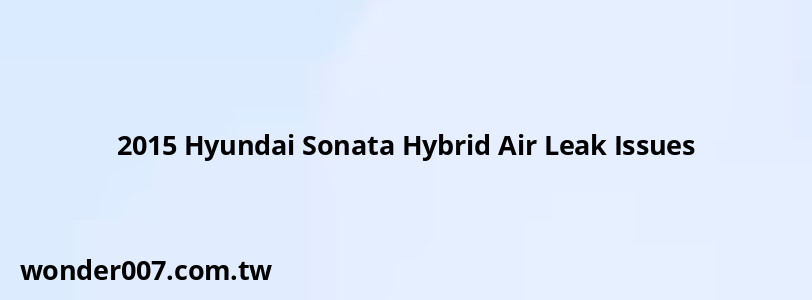2015 Hyundai Sonata Hybrid Air Leak Issues

Common Air Leak Problems
The 2015 Hyundai Sonata Hybrid may experience various air leak issues that can affect its performance and comfort. Vacuum leaks are among the most common problems, potentially causing rough idling, increased fuel consumption, and engine misfires. These leaks often occur in the intake system, particularly around the intake hose, throttle body, and various vacuum lines.
Another potential issue is air conditioning system leaks. These can result in warm air blowing from the vents, reduced cooling efficiency, and unusual noises when the A/C is running. The most frequent causes include damaged seals, cracked hoses, or faulty components like the compressor or condenser.
Identifying Air Leaks
Detecting air leaks in your 2015 Hyundai Sonata Hybrid requires careful inspection and attention to specific symptoms:
- Listen for hissing sounds near the engine, especially when the car is idling
- Check for a rough or unstable idle, which may indicate a vacuum leak
- Pay attention to decreased fuel efficiency, as this can be a sign of air leaks affecting engine performance
- Monitor the air conditioning performance, noting any reduction in cooling or unusual noises
Fixing Air Leaks
Addressing air leaks in your 2015 Hyundai Sonata Hybrid often involves the following steps:
- Inspect and replace damaged intake hoses or clamps
- Check and tighten connections on vacuum lines
- Examine the throttle body for signs of wear or damage
- Investigate the air conditioning system for leaks, including the compressor, condenser, and hoses
- Consider using a smoke machine to detect hard-to-find vacuum leaks
It's important to note that some air leak repairs may require specialized tools or expertise. Always consult a qualified mechanic if you're unsure about performing repairs yourself.
Preventing Future Air Leaks
To minimize the risk of future air leaks in your 2015 Hyundai Sonata Hybrid:
- Follow the recommended maintenance schedule in your owner's manual
- Regularly inspect hoses and connections for signs of wear or damage
- Keep the engine bay clean to more easily spot potential leaks
- Address any unusual noises or performance issues promptly to prevent minor problems from escalating
By staying proactive with maintenance and addressing issues early, you can help ensure your Hyundai Sonata Hybrid continues to perform efficiently and comfortably.
FAQs About 2015 Hyundai Sonata Hybrid Air Leaks
- How often should I check for air leaks in my Sonata Hybrid?
It's recommended to inspect for air leaks during regular maintenance, typically every 6 months or 5,000-7,500 miles, whichever comes first. - Can air leaks affect my Sonata Hybrid's fuel efficiency?
Yes, air leaks, especially vacuum leaks, can significantly reduce fuel efficiency by disrupting the air-fuel mixture in the engine. - Is it safe to drive with a suspected air leak?
While minor leaks may not pose immediate danger, it's best to have any suspected air leak diagnosed and repaired promptly to prevent potential damage or safety issues.
Related Posts
-
Hyundai Santa Cruz vs Subaru Outback
01-02-2025 • 377 views -
2019 Hyundai Tucson: Passenger Side Mirror Replacement Guide
29-01-2025 • 203 views -
2013 Hyundai Elantra GT: Understanding the Clock Spring
30-01-2025 • 219 views -
Remote Start for 2018 Hyundai Santa Fe: A Comprehensive Guide
30-01-2025 • 197 views -
Driver Side Mirror: Replacement Guide for 2015 Hyundai Sonata
29-01-2025 • 165 views
Latest Posts
-
2015 Chevy Traverse AC Recharge Port Location
01-02-2025 • 466 views -
Are O2 Sensors Covered Under Warranty
01-02-2025 • 426 views -
Rear Brake Caliper Piston Won't Compress
01-02-2025 • 407 views -
Power Steering Fluid Leak On Passenger Side
01-02-2025 • 510 views -
How To Turn Off Paddle Shifters Mercedes
01-02-2025 • 436 views
Popular Posts
-
Power Steering and ABS Light On: Causes and Solutions
27-01-2025 • 696 views -
V12 Engine Costs: What You Need to Know
26-01-2025 • 752 views -
EPC Light: Understanding Causes and Solutions
26-01-2025 • 1135 views -
Toyota Hiace: Fuel Efficiency Insights for 2025
26-01-2025 • 769 views -
Hino Warning Lights: Understanding Dashboard Alerts
26-01-2025 • 932 views
